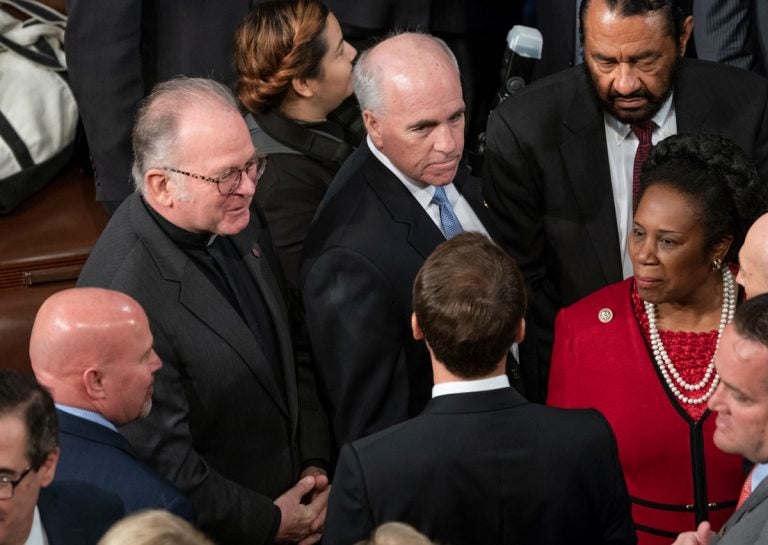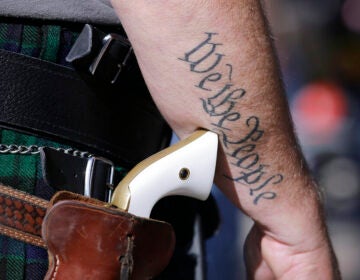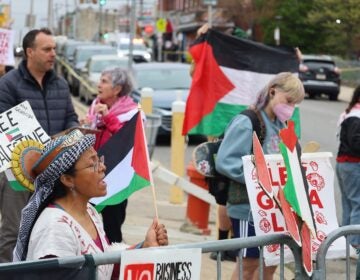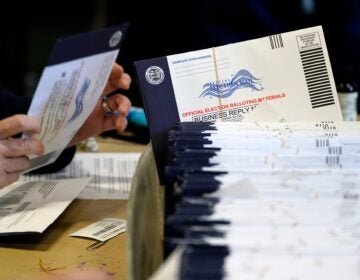Paul Ryan, one foot out the door, fires a priest who prays for the poor
Anyone nurturing a faint hope that Paul Ryan would turn compassionate in his waning hours of power has been jolted back to reality by his mimicking of King Henry II of England

Chaplain of the House of Representatives Father Patrick J. Conroy, upper left, speaks with French President Emmanuel Macron, bottom enter, at the Capitol in Washington, Wednesday, April 25, 2018. (AP Photo/J. Scott Applewhite)
Anyone nurturing a faint hope that Paul Ryan would turn compassionate in his waning hours of power has been jolted back to reality by his mimicking of King Henry II of England.
It was Henry, way back in 1170, who reputedly said, “Will no one rid me of this meddlesome priest?” His lament inspired four of his knights to slay the Archbishop of Canterbury. The difference now is that Ryan did the job himself, minus the blood, by firing the House of Representatives chaplain – a fellow Catholic – for the apparent sin of praying publicly for the poor. No House chaplain has ever been fired before, and it’s appropriate that we mark this historic occasion by savaging Ryan for the chasm that separates his right-wing politics from his professed devotion to his faith.
When the news broke late last week that Rev. Patrick Conroy was ousted after seven years on job, the most common reaction was “Huh?” What could possibly justify canning a man of the cloth, a Jesuit priest who’d been sworn in by the House Republicans? What could Conroy possibly have said that was so controversial that it warranted walking papers? Ryan has refused to explain, but the answer is obvious.
Last November, when House Republicans were readying their notorious tax cut bill that predictably benefits the rich at the expense of everyone else, Conroy opened a session with this prayer: “May all members be mindful that the institutions and structures of our great nation guarantee the opportunities that have allowed some to achieve great success, while others continue to struggle. May their efforts these days guarantee that there are not winners and losers under new tax laws but benefits balanced and shared by all Americans.”
Oh dear. Clearly the chaplain had forgotten to wear the right-wing armband. He merely (and mildly) voiced his Jesuit Catholic belief in social and economic justice – that benefits be “balanced and shared by all Americans” – a belief that was blatantly at odds with the GOP’s plutocratic philosophy. And that explains why Ryan subsequently told Conroy (according to Conroy), “Padre, you just got to stay out of politics.”
Well, apparently it was also “political” for Conroy to pray, on Dec. 21, that all House members govern for “the benefit of all, most particularly…the least among us.” And it was “political” for him to pray, on Jan. 12, that House members “serve other people in their need.” And it was “political” for him to pray, on Jan. 20: “May those who possess power here in Washington be mindful of those whom they represent who possess little or no power.”
Ryan couldn’t abide those kinds of prayers, which were actually more moral than political, because his own take on Catholicism blatantly favors the powerful. We’ve been hearing for years about his religious devotion – church every Sunday, flying home Thursdays so he can take his kids to Catholic school on Friday – but his intertwining of religion and politics is classic top-down, trickle-down. As he told the Christian Broadcasting Network in 2012, he believes in “the principle of subsidiarity…government closest to the people governs best…through our churches, through our charities.” In other words, a Catholic rationalization for free-market capitalism.
But that’s a highly selective reading of Catholic doctrine. Conroy’s House prayers were far more in sync with the contemporary Vatican, which openly questions whether capitalism can promote economic fairness and help the neediest. Indeed, when Pope Francis addressed the House in 2016, he was echoing a 2009 Vatican encyclical: “Economic activity cannot solve all social problems through the simple application of commercial logic.” It warned that “grave imbalances are produced when economic action, conceived merely as an engine for wealth creation, is detached from political action.” And it suggested that sometimes political action is necessary “for pursuing justice through redistribution.”
By contrast, Ryan was rebuked in 2012 by the United States Conference of Bishops for floating a budget blueprint that slashed federal programs for the neediest (on that front, he’s still trying). He has long been at odds with Jesus’ repeated advice – expressed in various Bible passages, including Matthew 19:16-30 – that the rich will be welcomed into the kingdom of God if they sell their possessions and give proceeds to the poor.
So in a sense it’s no surprise that he has axed a Catholic chaplain for praying that tax cut benefits be “balanced and shared by all Americans.” (Whatever happened to Ryan’s longtime crusade for “religious freedom”?) Conroy was merely channeling Dorothy Day, the Catholic activist who preached that “we must talk about poverty, because people insulated by their own comfort lose sight of it.” But alas, Paul Ryan’s earthly god is Ayn Rand, not Dorothy Day.
This guy is too chicken to face the voters in a re-election race, but apparently bold enough to fire a priest. What a profile in courage.
WHYY is your source for fact-based, in-depth journalism and information. As a nonprofit organization, we rely on financial support from readers like you. Please give today.




